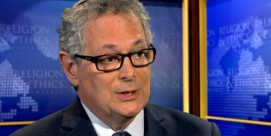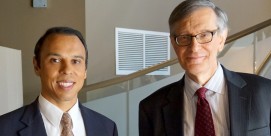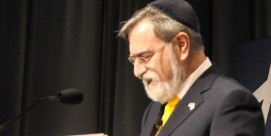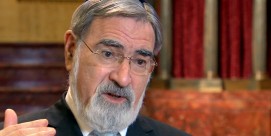Allen Hertzke: An Eloquent and Evocative Address
Mitt Romney’s speech at the Bush Presidential Library is firmly anchored in what Jon Meacham, in his book AMERICAN GOSPEL, describes as the “public religion” of the nation’s civic life. In a number of felicitous phrases replete with biblical allusions and echoes from the American civic canon, Romney pledged his absolute fealty to religious liberty, which he described as central to “America’s greatness” and the survival of a free land. “Any believer in religious freedom, any person who has knelt in pray to the Almighty, has a friend and ally in me,” he declared.
Romney appealed to the “common creed of moral convictions” shared by all Americans, that every human being is a child of God and thus entitled to inalienable rights. In a Tocquevillian turn of phrase, Romney said that “freedom requires religion just as religion requires freedom.” “Freedom and religion endure together,” he said, “or perish alone.” Evocatively, Romney also linked the Constitution’s prohibition against state religion to the religious vitality in America, in contrast to Europe’s established churches with cathedrals “so inspired…so grand…so empty.”
Because Romney’s speech obviously harkens back nearly a half century ago to John Kennedy’s address before Baptist ministers in Houston, it is instructive to compare the two. Like JFK, Romney pledged his loyalty to the Constitution and declared that if he was fortunate enough to take the presidential oath of office he would view that as “my highest promise to God.” Like Kennedy, Romney assured his fellow Americans that “no authorities” of his church would “exert influence over his presidential decisions.” In a direct echo of Kennedy’s address Romney said that he was not a Mormon running for president but an American running for president who happened to be Mormon. Like Kennedy, Romney linked the history of his people to the American story of advancing tolerance and freedom, but he did so by shining the light on shortcomings: “Anne Hutchinson was exiled from Massachusetts Bay, a banished Roger Williams founded Rhode Island, and two centuries later, Brigham Young set out for the West.”
Unlike Kennedy, Romney did not entertain the possibility that a conflict could arise between the dictates of his religious faith and his constitutional obligations. Kennedy declared that if such a rare choice presented itself he would resign from office. Romney made no such declaration.
Romney also had to go further in defining his faith than did Kennedy. Although he refused to explain his church’s distinctive doctrines — because to do so would “enable the religious test the Founders prohibited in the Constitution” — Romney did declare his Christianity in simple, accessible language: “I believe that Jesus Christ is the Son of God and the Savior of mankind.” But he also embraced the “the faith of my fathers,” pledging to be true to his Mormon beliefs. He did not think that would sink his candidacy because Americans respect “conviction” and “tire of those who would jettison their beliefs, even to gain the world.”
Tellingly, where Kennedy outlined the challenge from communism, Romney identified as a mortal threat to America the “theocratic tyranny” of “radical violent Islam.” Though not likely to be well received by American Muslims, this phrase seems designed to create solidarity with the majority of non-Mormons in the nation.
Romney’s speech was more overtly religious than Kennedy’s. Kennedy in effect said that his faith would have no bearing on his public work, and he went out of his way to oppose positions — such as state support for parochial schools — backed by his church hierarchy. Declaring that the separation of church and state should be “absolute,” Kennedy envisioned a civic life in which no religious body would seek to influence public policy (which he described as attempting to impose its will on officials).
Reflecting the tenor of public discourse in conservative circles today, Romney, in contrast, charged that church-state separation had been distorted by secularists in an attempt to remove religion from public life. “We should acknowledge the Creator as did the Founders — in ceremony and word. He should remain on our currency, in our pledge, in the teaching of our history, and during the holiday season nativity scenes and menorahs should be welcome in our public places.”
In evoking both the Bible and America’s public religion, Romney described how he “was taught in my home to honor God and love my neighbor.” He saw his “father march with Martin Luther King” and his “parents provide compassionate care to others.” He said he was moved by “the Lord’s words,” in Matthew 25, to feed the hungry and clothe the naked.
Romney’s speech celebrated religious pluralism in more vivid terms than Kennedy. Where Kennedy referenced the Jew, the Quaker, the Unitarian, or the Baptist who suffered persecution for their faith, Romney made a more personal declaration. He declared that he loved “the profound ceremony of the Catholic Mass, the approachability of God in the prayers of the evangelicals, the tenderness of spirit among the Pentecostals, the confident independence of the Lutherans, the ancient traditions of the Jews… and the commitment to frequent prayer of the Muslims.”
Romney’s speech was thus even more ecumenical than Kennedy’s. One could hear evocations, even, of John Paul II’s encyclical Fides et Ratio, when he spoke of how “reason and religion” join to lift the human spirit in the cause of liberty.
Will the speech make a difference? Probably. It was an often eloquent and evocative address designed to allay concerns of evangelicals, tie his personal story to the nation’s heritage, and appeal to the broader public. But it remains to be seen whether it will do enough to win the hearts of born-again Christians who still view Mormonism as a non-Christian cult. One thing is likely: whether or not Romney wins the presidency, his quest will renew and advance the distinctly American refrain for religious freedom.
Allen Hertzke is professor of political science and director of religious studies at the University of Oklahoma.







